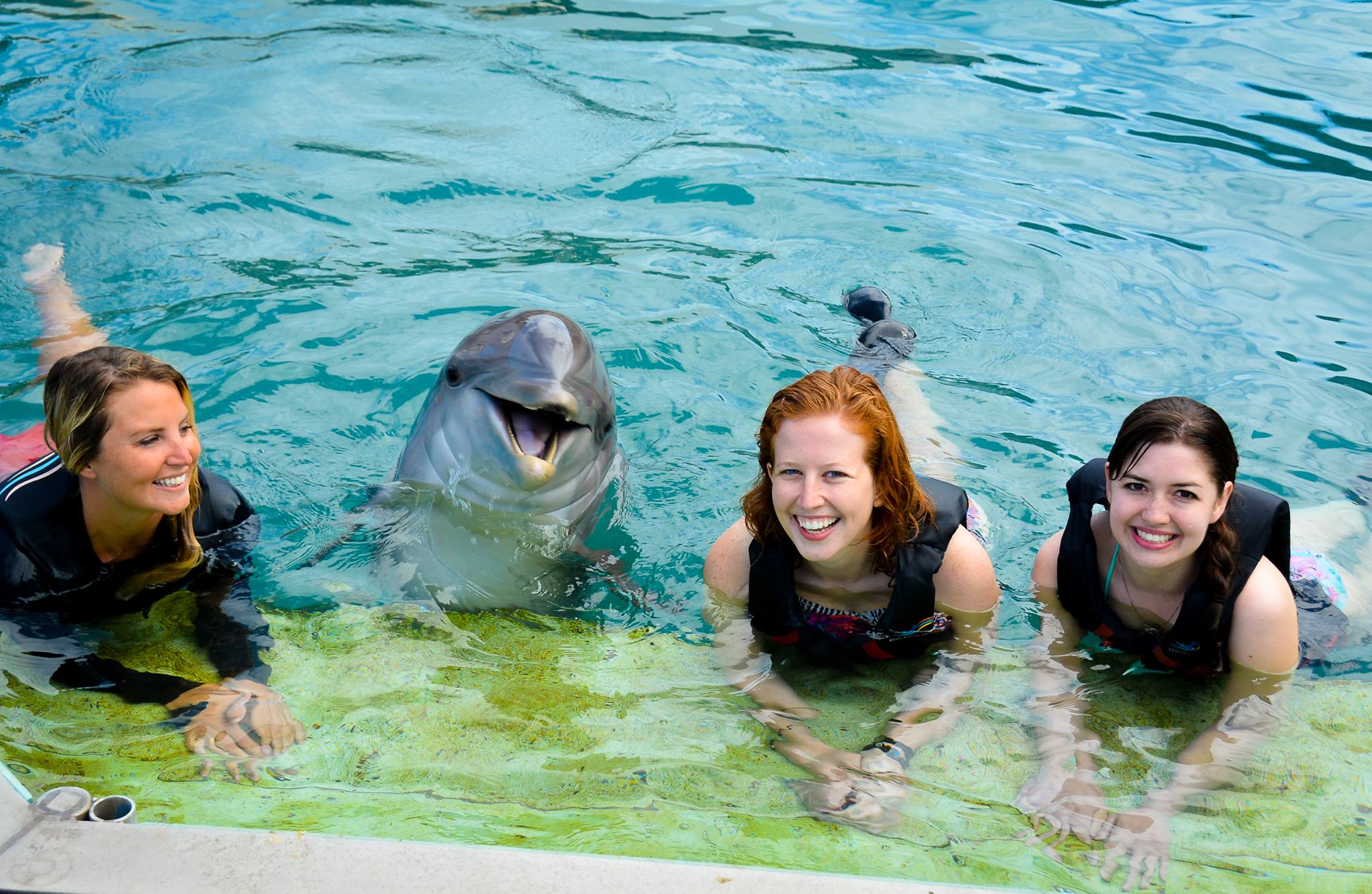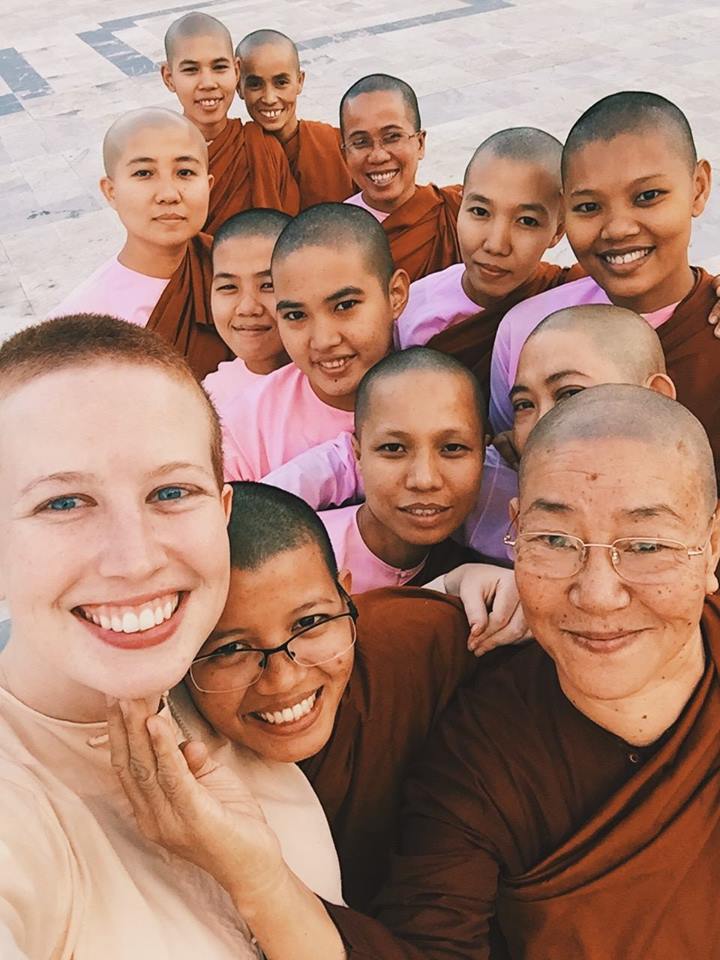By Julie Wrinn
 Brittney Woodrum (B.A. ’15) never expected to major in Hispanic Studies, or train dolphins in Bermuda, or teach English to Buddhist nuns in Myanmar, or become a Fulbright Fellow. But she has done all of these things and is now in her second year as a Princeton Fellow in Asia. Connecting all of these endeavors is a love of languages, and that love caught fire in UK’s Department of Hispanic Studies.
Brittney Woodrum (B.A. ’15) never expected to major in Hispanic Studies, or train dolphins in Bermuda, or teach English to Buddhist nuns in Myanmar, or become a Fulbright Fellow. But she has done all of these things and is now in her second year as a Princeton Fellow in Asia. Connecting all of these endeavors is a love of languages, and that love caught fire in UK’s Department of Hispanic Studies.
“Every single Spanish professor I’ve taken has been so fantastic,” recalls Woodrum. She was especially impressed with a study abroad trip to Madrid led by Dr. Susan Larson. “She was a very inspiring, powerful woman. I really admired her, seeing where she went with Spanish. She was American, but she seemed so natural with the language and the culture. She showed me that you could become part of an entirely new world just with language.”
In high school, Woodrum was full of plans, but she never actually planned to go to UK or even to major in Spanish. For most of her teenage years, Woodrum intended to go into a medical field, until her version of a rebellious phase struck in her senior year. Suddenly this high-achieving Governors Scholar from Winchester, Ky., wanted to study animation and storytelling at an out-of-state art college. Since Governor’s Scholars receive free tuition at public universities in Kentucky, her parents balked.
“They were like, ‘we’re not going to pay for that when you have so many opportunities in Kentucky,’” she said.
If she still wanted to pursue a career in animation after college in Kentucky, they would support that. And so, Woodrum began researching arts programs around Kentucky. On the advice of a high school art teacher, she discovered the Arts Administration major at UK.
Contrary to her expectations, however, almost immediately Spanish became Woodrum’s favorite class. “My first Spanish class was with Dr. Lagos, who was Chilean. We really respected him. He had this quiet authority,” she said.
Compared to her Spanish classes at George Rogers Clark High School in Winchester, studying Spanish at UK was an entirely different experience. “It was an environment where I was being taught in a very professional manner and had native teachers,” she said. In her second semester of freshman year, Woodrum changed to a dual degree in Arts Administration and Spanish.
And where did she find the time to train dolphins? That experience began with Woodrum taking a year off from college to enroll in a five-month internship in the Disney College Program. Her main occupation was as a lifeguard, but she was exposed to such a variety of talented people in the Disney organization that she gained the confidence to apply for what she thought was her dream job.
“I got an internship in Bermuda for six months to train dolphins,” Woodrum said. “I’m so glad I did it, because I found that it was ultimately not my dream job. I found that many times. And because of those experiences I let go of this idea of a dream job. This is something I took away from Arts Administration and working with nonprofits: finding a mission that I like and want to support, and finding a group of people whom I want to work with, who are encouraging and creative and are constanly looking for ways to support that mission.”
This kind of boundless imagination has become her life ideology. Back at UK, while finishing up her degrees in Hispanic Studies and Arts Administration, Woodrum applied for a Fullbright and was offered a position teaching English in a public middle school in Guadalajara, Mexico. She was grateful for the prestige of earning a Fullbright, but this dream opportunity was ultimately a disappointment, as the English teaching assistants were not given much responsibility. The experience had many silver linings.
“I lived with a Mexican family, who were wonderful, and nightlife in Guadalahara was popping. It’s a very young city, and I really got a taste of the culture,” Woodrum said.
 Next Woodrum heard of the Princeton in Latin America fellowships and applied, but the Princeton in Asia program was much larger and older, 20 fellowships vs. 150, and this openness to a whole new continent led to Woodrum’s next adventure.
Next Woodrum heard of the Princeton in Latin America fellowships and applied, but the Princeton in Asia program was much larger and older, 20 fellowships vs. 150, and this openness to a whole new continent led to Woodrum’s next adventure.
“I went into my Princeton in Asia interview totally honest,” she said. “I was like, ‘Look, I know nothing about Asia. But when I was in Mexico, I knew of other Fellows who were in the middle of nowhere, sleeping in hammocks, and they were the only people who spoke English in their communities. I feel like I’m ready for that next step. I don’t care where you send me, but ultimately I just want to be in a very immersive cultural experience. I am willing to give all of myself to that culture and just totally dive in and learn anything and everything that someone is willing to teach me.’”
The Princeton in Asia interviewers liked what they heard from Woodrum. A new post had been launched that year at a Buddhist nunnery in Myanmar, where learning English was a crucial step in the career ladder for many of the women, who aspired to study abroad for their master’s degrees in places like India or Sri Lanka, where classes are taught in English. Others wanted to teach abroad themselves some day. It’s hard to imagine them finding a more enthusiastic teacher than Brittney Woodrum.
“I was so hungry to learn everything about their world,” she said. “I shaved my head and went with just a backpack. I fell in love with these women. They were so gracious. I never felt ostracized at all for not subscribing to their religion. I respected it and wanted to learn.”
The nuns didn’t speak English, but that wasn’t a problem for Woodrum, because she was such an avid learner and eager to try speaking Burmese.
“All these women are basically teachers. That’s what they’re training to be, and they were so gracious and kind and ready to help me. I would say one word in Burmese, and they would laugh and giggle,” Woodrum said. “I was always experimenting with the language, because I had Spanish under my belt, and so I was trying to think about it logically. For example, I thought, here is verb you can only use with people, but is there a verb you can only use with animals? And they would be crying, they would be laughing so hard. It gave us constant material to talk about.”
Sometimes Woodrum would leave the nunnery for a night on the town with other Fellows in the nearby city of Yangong, and she would try out her Burmese on new audiences. “People would see me, very much a Westerner, and they would not expect Burmese to come out of my mouth. Sometimes they would be listening for English and say, ‘I have no idea what you just said.’ People are scared when they’re learning a new language, that they’ll sound stupid or make mistakes, but that’s not my personality at all.”
But most of Woodrum’s nights were spent at the nunnery. “I’d go to their bedroom and—kind of like the children’s book Madeline—they all slept in the same room: bed bed bed bed bed. And we’d have our little lamps and mosquito nets, and I would have them read to me in English,” she said. “English pronunciation is so difficult. They wouldn’t understand what they were reading, but we would work on that, and that’s how we would have fun at night. Or I would read to them in Burmese. Once I learned to read and write in Burmese, I was really able to take my learning into my own hands.”
So what does the future hold for Brittney Woodrum?
During this second year as a Princeton in Asia Fellow, she’s working with an outdoor education NGO (nongovernmental organization) in Bangkok, Thailand, called Jump. The majority of students in international schools come from wealthy backgrounds and sometimes live very sheltered lives.
“At Jump Schoool, we take them out of their comfort zone and try to expose them to the real world in places like sweatshops and minefields in Laos and Cambodia,” Woodrum explained. The goal is that, when these scions become CEOs or ambassadors in the future, they’ll have the seeds of knowledge and experience concerning the lives of their impoverished fellow citizens.
Woodrum is also applying to graduate school, with a single over-arching goal: to learn as many languages as possible.
“Looking back at my time at UK, I wish I’d done a triple major, also learning a language like Russian or Japanese,” she said. “It’s a lot of logic and puzzles and figuring out patterns, but ultimately language is about communication. And I found a really great community in UK Hispanic Studies.”
